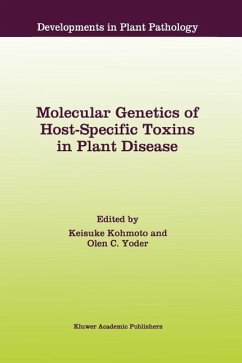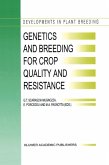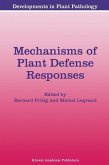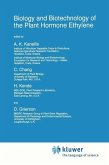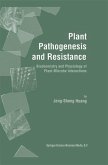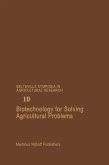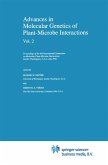Molecular Genetics of Host-Specific Toxins in Plant Disease (eBook, PDF)
Proceedings of the 3rd Tottori International Symposium on Host-Specific Toxins, Daisen, Tottori, Japan, August 24-29, 1997
Redaktion: Kohmoto, Keisuke; Yoder, Olen C.


Alle Infos zum eBook verschenken

Molecular Genetics of Host-Specific Toxins in Plant Disease (eBook, PDF)
Proceedings of the 3rd Tottori International Symposium on Host-Specific Toxins, Daisen, Tottori, Japan, August 24-29, 1997
Redaktion: Kohmoto, Keisuke; Yoder, Olen C.
- Format: PDF
- Merkliste
- Auf die Merkliste
- Bewerten Bewerten
- Teilen
- Produkt teilen
- Produkterinnerung
- Produkterinnerung

Hier können Sie sich einloggen

Bitte loggen Sie sich zunächst in Ihr Kundenkonto ein oder registrieren Sie sich bei bücher.de, um das eBook-Abo tolino select nutzen zu können.
For investigators engaged in the study of toxins generally, and host-specific toxins in particular, it is a rare treat to attend a meeting in which toxins involved in plant pathogenesis are emphasized. A gathering of this type provides opportunity to consider the discovery of new toxins, their chemical structures, genes encoding enzymes that control their biosyntheses, their sites of action and physiological effects on plants, and their roles (if any) in pathological processes. Having acknowledged the inspiration fostered by a 'toxin meeting', however, it is important to point out that the…mehr
- Geräte: PC
- ohne Kopierschutz
- eBook Hilfe
- Größe: 43.92MB
![Genetics and Breeding for Crop Quality and Resistance (eBook, PDF) Genetics and Breeding for Crop Quality and Resistance (eBook, PDF)]() Genetics and Breeding for Crop Quality and Resistance (eBook, PDF)40,95 €
Genetics and Breeding for Crop Quality and Resistance (eBook, PDF)40,95 €![Biology and Biotechnology of the Plant Hormone Ethylene II (eBook, PDF) Biology and Biotechnology of the Plant Hormone Ethylene II (eBook, PDF)]() Biology and Biotechnology of the Plant Hormone Ethylene II (eBook, PDF)161,95 €
Biology and Biotechnology of the Plant Hormone Ethylene II (eBook, PDF)161,95 €![Mechanisms of Plant Defense Responses (eBook, PDF) Mechanisms of Plant Defense Responses (eBook, PDF)]() Mechanisms of Plant Defense Responses (eBook, PDF)40,95 €
Mechanisms of Plant Defense Responses (eBook, PDF)40,95 €![Biology and Biotechnology of the Plant Hormone Ethylene (eBook, PDF) Biology and Biotechnology of the Plant Hormone Ethylene (eBook, PDF)]() Biology and Biotechnology of the Plant Hormone Ethylene (eBook, PDF)73,95 €
Biology and Biotechnology of the Plant Hormone Ethylene (eBook, PDF)73,95 €![Plant Pathogenesis and Resistance (eBook, PDF) Plant Pathogenesis and Resistance (eBook, PDF)]() Jeng-Sheng HuangPlant Pathogenesis and Resistance (eBook, PDF)233,95 €
Jeng-Sheng HuangPlant Pathogenesis and Resistance (eBook, PDF)233,95 €![Biotechnology for Solving Agricultural Problems (eBook, PDF) Biotechnology for Solving Agricultural Problems (eBook, PDF)]() Biotechnology for Solving Agricultural Problems (eBook, PDF)161,95 €
Biotechnology for Solving Agricultural Problems (eBook, PDF)161,95 €![Advances in Molecular Genetics of Plant-Microbe Interactions, Vol. 2 (eBook, PDF) Advances in Molecular Genetics of Plant-Microbe Interactions, Vol. 2 (eBook, PDF)]() Advances in Molecular Genetics of Plant-Microbe Interactions, Vol. 2 (eBook, PDF)161,95 €
Advances in Molecular Genetics of Plant-Microbe Interactions, Vol. 2 (eBook, PDF)161,95 €-
-
-
Dieser Download kann aus rechtlichen Gründen nur mit Rechnungsadresse in A, B, BG, CY, CZ, D, DK, EW, E, FIN, F, GR, HR, H, IRL, I, LT, L, LR, M, NL, PL, P, R, S, SLO, SK ausgeliefert werden.
- Produktdetails
- Verlag: Springer Netherlands
- Seitenzahl: 415
- Erscheinungstermin: 6. Dezember 2012
- Englisch
- ISBN-13: 9789401152181
- Artikelnr.: 43984994
- Verlag: Springer Netherlands
- Seitenzahl: 415
- Erscheinungstermin: 6. Dezember 2012
- Englisch
- ISBN-13: 9789401152181
- Artikelnr.: 43984994
